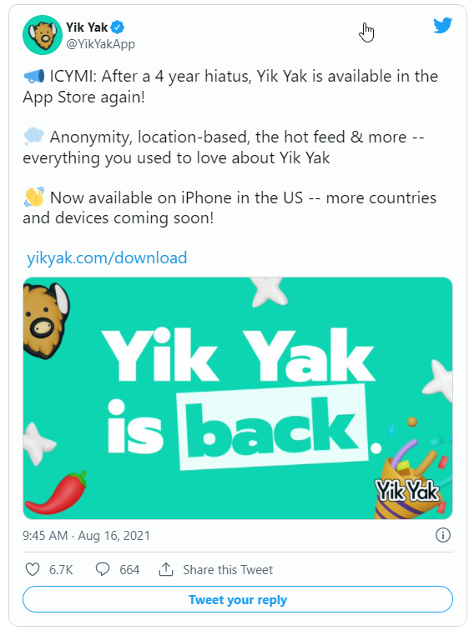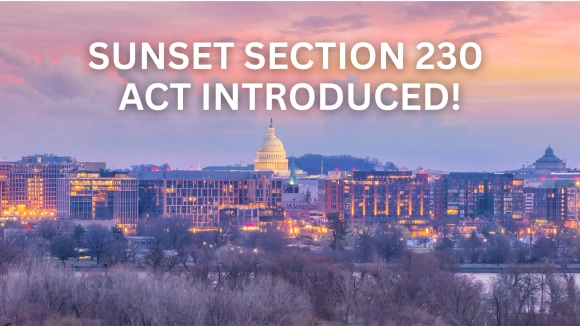Is the new Yik Yak any better?
Yik Yak, the anonymous social media app which was shut down in 2017 on account of rampant harassment and abuse, returned in August 2021. And with it returned the harms we saw with the old app.
Yik Yak’s Design Encourages Harassment and Violence
Yik Yak was initially intended to function as a “virtual bulletin board,” on which people could make anonymous posts that would be shared with users located within a 5 mile radius. Other users could “upvote” or “downvote” the posts, also anonymously, and the top posts would be featured in a “hot feed.” Unfortunately, the combination of anonymity, locality, and the upvote/downvote feature facilitated an environment where harassment and violence, including sexual violence, raged with impunity. For example, in one particularly tragic case, the representative of a University Feminist Club was murdered after months of anonymous threats of sexual and physical violence through Yik Yak. The New York times noted another case of gang rape threats.
Research analyzing the Yik Yak app concluded that these and other forms of abuse were not only enabled but encouraged by the Yik Yak design—specifically, the three aforementioned features of anonymity, locality, and upvoting/downvoting.
As explained in this research, the feature of anonymity did away with any sense of social accountability or responsibility, and instead allowed perpetrators to act without fear of judgment or punishment. It also decreased empathy by creating a distance between the perpetrator and victim, and removing reminders of the victim’s humanity (ex. a profile photo.)
At the same time, the localized nature of the Yik Yak app meant that harassment did not remain at a distance but could easily escalate to the infliction of physical harm, since the perpetrators lived in proximity to their victims. Thus threats of sexual and physical violence could be and were carried out.
Finally, the research notes that the feature of anonymously upvoting and downvoting posts made it easy for bystanders to partake in the harassment by “cheering on” the perpetrator. Such harmful participation could also be conducted with impunity and a lack of social accountability. Furthermore, the upvoting/downvoting and the hot feed feature encouraged users to “one up” each other, often with increasingly aggressive or extreme posts.
The “New” Yik Yak App Brings the Same Problems
As the Yik Yak app returned, the new owners claimed that they would take a “serious stance” against harassment. However, they were also clear that the design features which encouraged harassment and violence in the first place would still be a part of the app. Yik Yak says: “Anonymity, location-based, the hot feed & more—everything you used to love about Yik Yak.” A more appropriate slogan would be: “Anonymity, location-based, the hot feed & more—everything which fueled violence and harassment.”

It is therefore no surprise that, shortly following the Yik Yak apps’ relaunch, reports of abuse started flooding back in. One female college student reported a string of posts sexually harassing and objectifying her. Reports have also been made of threats, cyberbullying, stalking, slander, racism, and more.
Yik Yak also landed itself the fourth spot on Bark’s “12 Most Dangerous Apps for Kids” list for 2022.
The New App’s Insufficient Safety Policies and Features
On paper, the new Yik Yak app prohibits “anything that could be construed as bullying, abuse, defamation, harassment, stalking, or targeted hate or public humiliation.” However, as the above cases of abuse demonstrated, this policy clearly is not sufficiently enforced. Additionally, it is prohibited under the new app’s privacy guidelines to use anyone’s real names or other identifying features in posts. Yet in many of the above cases, the victims of harassment were mentioned by their real names. New safety policies are meaningless if Yik Yak will not rigorously enforce them and if they will not remove the inherently dangerous features of the app.
One “safety” feature that has been designed into the new app and which Yik Yak claims will help filter out harmful content is that any post receiving a net score of –5 through upvotes/downvotes will be hidden from view. However, this assumes that users will act with integrity in downvoting harmful content and upvoting positive content. As the previously discussed research indicated, this was often not the case. Harmful content on Yik Yak was often upvoted, thus further encouraging the harassment and violence. Therefore, this new “safety” feature will likely have little to no impact in preventing harm.
There is no reason to think that the “new” Yik Yak is any safer than its predecessor. All the design features which made the app inherently dangerous have been brought back. New safety policies are insufficiently enforced and new safety features are insufficient in their design.
Yik Yak is a breeding ground for violence and harassment, and we encourage you to be exceedingly cautious about this app, particularly for children.


